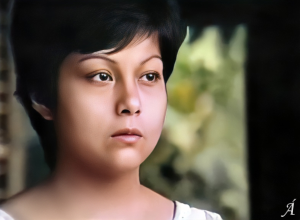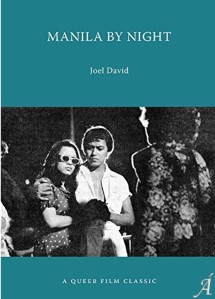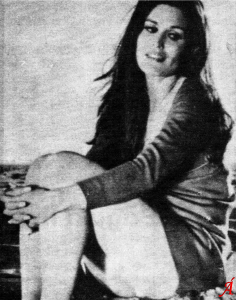With the announcement of Jaclyn Jose’s sudden demise last March 2, a significant number of mostly middle-aged Filipino film observers were stunned to realize that, in keeping aware of her, a full, challenging, and ultimately triumphant life became their privilege to witness. Even the trajectory of her physical appearance, from anxious young waif to authoritative full-bodied matron, bespoke a life conducted at peak critical tension, constantly in search of solutions to creative challenges and grateful to be afforded the opportunity to find fulfillment in a specialized type of stardom where her work discipline and moral integrity ensured that she would have next to no rivals whatsoever.

Jaclyn Jose in her early waifish phase. [From her Facebook fan page]
11011In a remarkable interview with Ricky Lee, who was writing a number of screenplays for her, she foregrounded the debates her professional self was having with her religious orientation. (Titled “Walang Bold sa Langit” or “Bold Not Allowed in Heaven,” the piece was reprinted in a number of Philippine outlets as a tribute to her.) She admitted, among other things, that she was hoping to compensate for what she considered were transgressions, by performing the standard penance of good work.
11011In fact, she was already overcompensating even that early. William Pascual, who directed her in the ensemble Chikas, picked her out to star in the superior chamber piece Takaw Tukso, where she outshone the then-best available names for a crime-of-passion melodrama. She achieved the same feat of upstaging more established actors in White Slavery – which happened to be directed by Lino Brocka, who consequently made sure that she would be the sole female lead in Macho Dancer. Chito S. Roño’s debut, Private Show, showcased what was arguably the most challenging “bold” role possible, that of a live-sex performer, which another star, Sarsi Emmanuelle, had already made definitive in Tikoy Aguiluz’s Boatman.
11011Private Show was railroaded by the February 1986 people power uprising, since it was the type of extreme sample that could only be screened in the Marcoses’ censorship-exempt venue, the Manila Film Center. More than any of Jose’s earlier work, it contained passages that were also bold in the sense of being expressionist and surreal, expertly (possibly even lovingly) melded with an approach to material that combined naturalism with social critique. When Roño, still with Lee scripting, decided to unfold a diptych with Curacha: Ang Babaeng Walang Pahinga, he cast the post-Marcos era’s top sex siren, Rosanna Roces, but he also provided a climactic moment where Jose’s character reappeared to suggest solidarity – not just between two generations of live-sex characters, but also between the best bold stars of their respective eras.

Jaclyn Jose in a midcareer supporting role, in Marilou Diaz-Abaya’s May Nagmamahal sa Iyo (1996). [Screencap by Jojo Devera][2]
11011With the emergence of digital technology and streaming services in the new millennium, Jose was able to secure greater opportunities in her career path. She could once more land an occasional lead role, and explore her potential for class-parodic comedy in TV series. The lesson she provided as exemplar was undeniable to anyone who bothered to take stock: one may already have the rare fortune of emerging fully formed, but longevity can only be attained through hard work, in her case in both analytic and physical terms. From this perspective, her Cannes Film Festival prize merely affirmed what Filipino audiences already realized and admired about her through several decades of familiarity.
11011The few instances where she mentioned feeling abandoned should not be conflated with the tragic circumstances of her death from a bad fall when no one was present to check on her well-being. She’d always known that life would be hard, and that the pursuit of artistic excellence will always be a lonely undertaking. Her initial appearance reminded observers, no doubt including Brocka, of a talented predecessor, Claudia Zobel, who died in a horrific car accident – as Brocka also would a few years later; two other waifish bold stars, Pepsi Paloma and Stella Strada, died by their own hands at the time when Jose was contending with a decline in film assignments. One might wish she lived longer than she did, but we could just as well marvel at how she managed to thrive as long as she had.

Near-contemporaneous nymphets, in order of emergence: Claudia Zobel (1965-84), Pepsi Paloma (1966-85), Stella Strada (1965-84), Jaclyn Jose (1963-2024). [Various screencaps posted and saved from internet sources]
Notes
First published March 9, 2024, in The FilAm. The author would like to thank filmmakers Lawrence Fajardo and Ellen Ongkeko-Marfil, and film critics Jerrick Josue David, Jojo Devera, and Mauro Feria Tumbocon Jr., for providing additional insight and information.
[1] Jaclyn Jose’s extraordinarily sharp instincts as performer were complemented by her manager Ed Instrella’s preparation in nationalist theater (with the Philippine Educational Theater Association) and inclination toward independent projects. At their respective career peaks, Instrella’s talents – among whom were Cherry Pie Picache, Julio Diaz, Gardo Verzosa, and Alan Paule – were consistently highly valued for their willingness to immerse in sex-themed films while delivering fine performances. I am grateful to Mau Tumbocon for bringing up this frequently overlooked background detail.
[2] In his tribute post to Jaclyn Jose’s triumph at Cannes, critic Jojo Devera mentioned that “if I were to choose one small, elegantly wrapped gift [from Marilou Diaz-Abaya] above all others, it would be the role she created for Jose in the ensemble of May Nagmamahal sa Iyo (1996), where she’s both exacting and brilliant. In an immensely sad film, her Editha is one of the saddest things, carrying her disappointment with a show of lightness we know is just an attempt to save face” (Facebook, May 24, 2016).
[3] In his article “Back in Her Element,” film scholar Johven Velasco wrote: “Although she’s gifted with one of local cinema’s most haunting and eloquently mobile faces capable of articulating a gamut of emotions, detractors have criticized her monotonic speech pattern. In due time, she would correct this shortcoming as she did television soap operas and drama series that required a style of acting that contrasted markedly with the subtlety and control that she was becoming known for” (Huwaran/Hulmahan Atbp., University of the Philippines Press, 2009, p. 15).
11011In editing Velasco’s posthumous volume, I queried Ed Instrella (see endnote 1) regarding the Internet Movie Database’s misspelling (since corrected) of Jose’s screen appellation. Instrella clarified that her given name should be spelled without a k – hence, the films that credited her as “Jacklyn” were in error; Mary Jane Guck (Jose’s real name, possibly a deliberate and playful reference to cannabis) expressed her concurrence in an SMS forwarded by Instrella: “nagkakamali lang yung iba pero hayaan mo na [others are mistaken but just let them be]” (February 17, 2008, 4:41 p.m.).













 ORCID ID
ORCID ID 